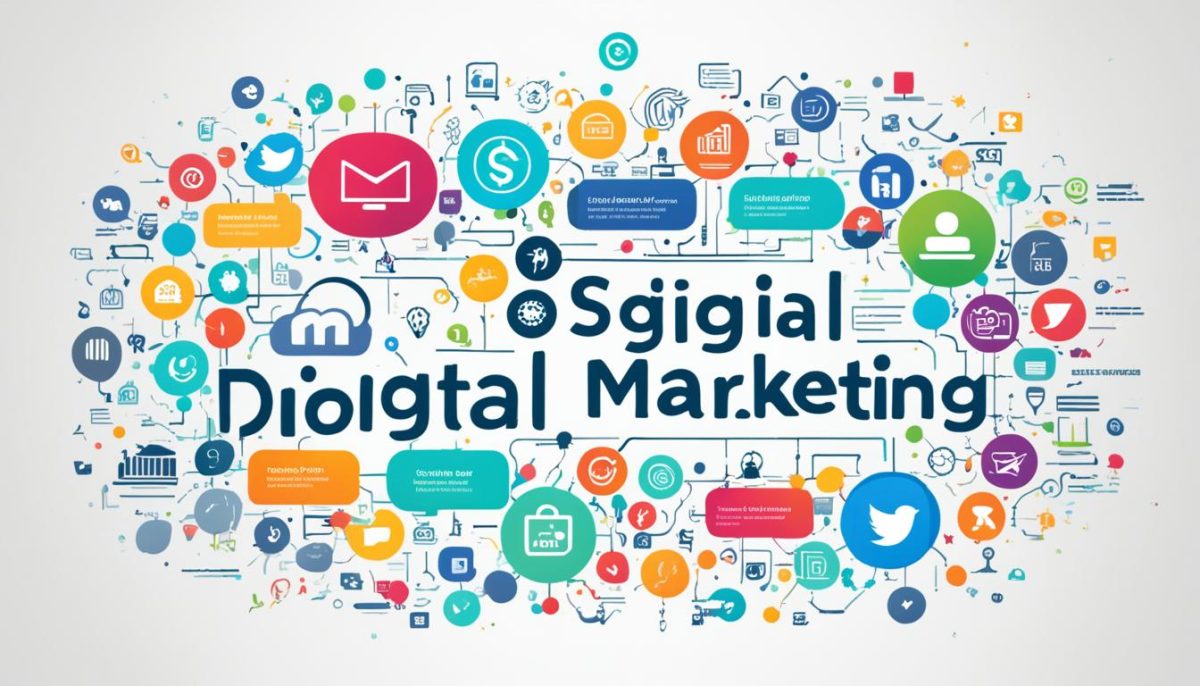Welcome to our series on digital marketing! In this section, we will explore the concept of digital marketing and how it has revolutionized the way brands connect with audiences online. At its core, digital marketing is the practice of utilizing various online channels to promote products and services, driving brand awareness, engagement, and conversions.
In today’s digital age, it’s crucial for businesses to have a strong online presence. With more and more consumers turning to the internet for their purchasing decisions, brands are recognizing the importance of connecting with their target audiences in the digital realm. Digital marketing provides a powerful and effective way to achieve this.
One of the key advantages of digital marketing is its ability to reach a vast and diverse online audience. By leveraging online marketing strategies, brands can connect with potential customers across different platforms, such as search engines, social media, and websites. This reach allows for targeted and personalized messaging that resonates with specific demographics and interests.
Another significant benefit of digital marketing is cost-effectiveness. Compared to traditional marketing methods, such as print ads or TV commercials, digital marketing often offers a much higher return on investment. With well-planned campaigns and strategic targeting, brands can optimize their budget and achieve impressive results without breaking the bank.
In the next sections, we will delve deeper into the key components of digital marketing, including website optimization, social media marketing, content marketing, and search engine optimization. We will also explore various strategies and techniques that brands can employ to create successful digital marketing campaigns, such as online advertising, email marketing, influencer marketing, and video marketing.
To kick off our exploration, let’s take a look at a visually appealing representation of digital marketing in action:
The Benefits of Digital Marketing
Digital marketing offers numerous advantages for businesses looking to enhance their online presence and reach a wider audience. By leveraging the power of digital platforms, brands can enjoy increased brand visibility, connect with their target audience, and achieve cost-effective marketing results.
Increased Brand Visibility
Digital marketing enables brands to expand their visibility in the online space. With the proliferation of internet usage and the rise of social media, consumers are spending more time online than ever before. By implementing effective digital marketing strategies, businesses can ensure that their brand is present where their target audience is actively engaging. This increased brand visibility not only enhances recognition but also facilitates brand recall and trust among consumers.
Target Audience Connection
One of the greatest benefits of digital marketing is the ability to connect with a specific target audience. Through various digital channels such as social media, search engines, and email marketing, businesses can directly target and engage with their ideal customers. This targeted approach allows for personalized communication and tailored messaging, leading to a higher likelihood of converting leads into loyal customers.
Cost-Effective Marketing
Digital marketing offers a cost-effective alternative to traditional marketing methods. Compared to print ads, TV commercials, or billboards, digital marketing is often more affordable and provides a higher return on investment (ROI). Businesses can allocate their marketing budgets more efficiently by utilizing targeted online advertising, content marketing, and email campaigns. Additionally, digital marketing allows for easy tracking and analysis of marketing efforts, enabling businesses to make data-driven decisions and optimize their strategies for better results.

| Traditional Marketing | Digital Marketing |
|---|---|
| Expensive print ads | Affordable online advertising |
| Limited reach | Global audience potential |
| Difficulty in tracking ROI | Real-time performance analytics |
| Less personalized communication | Targeted messaging |
Key Components of Digital Marketing
When it comes to digital marketing, there are several key components that play a crucial role in its success. Understanding these components is essential for businesses looking to enhance their online presence and reach their target audience effectively.
-
Website Optimization:
A well-optimized website is the foundation of any successful digital marketing strategy. By ensuring your website is user-friendly, loads quickly, and is mobile-responsive, you provide visitors with an optimal browsing experience. This helps improve your website’s visibility in search engine results, driving organic traffic and improving conversion rates.
-
Social Media Marketing:
Social media platforms have become powerful tools for brands to connect with their audience, build relationships, and promote their products or services. By creating engaging content, utilizing targeted advertising, and leveraging user-generated content, businesses can effectively leverage social media marketing to increase brand awareness and drive traffic to their websites.
-
Content Marketing:
Content marketing involves creating and distributing valuable, relevant, and consistent content to attract and engage a target audience. By producing high-quality blog posts, articles, videos, and infographics, businesses can establish themselves as industry experts and build trust with their audience. Content marketing also plays a vital role in search engine optimization, as search engines look for fresh and relevant content to rank websites.
-
Search Engine Optimization:
Search engine optimization (SEO) is the process of optimizing your website to improve its visibility in search engine results. By using relevant keywords, optimizing meta tags, building quality backlinks, and improving site speed, businesses can increase their organic search rankings and drive more targeted traffic to their websites.
By implementing these key components of digital marketing, businesses can create a comprehensive strategy that maximizes their online presence, engages their target audience, and drives conversions. It’s important to understand that these components work together, each supporting and enhancing the other. Incorporating these components into your digital marketing efforts will help you stay ahead of the competition and achieve your business goals.
| Key Components | Description |
|---|---|
| Website Optimization | Ensuring your website is user-friendly, loads quickly, and is mobile-responsive to improve visibility in search engine results and drive organic traffic. |
| Social Media Marketing | Utilizing social media platforms to connect with your audience, build relationships, and promote products or services. |
| Content Marketing | Creating and distributing valuable, relevant, and consistent content to attract and engage a target audience, establishing trust and positioning yourself as an industry expert. |
| Search Engine Optimization | Optimizing your website with relevant keywords, meta tags, backlinks, and site speed to improve organic search rankings and drive targeted traffic. |
Digital Marketing Strategies and Techniques
Now that we have explored the key components of digital marketing, it’s time to dive into the various strategies and techniques that can be implemented to achieve your marketing goals. Whether you are looking to increase brand awareness, drive website traffic, or generate leads, there are several approaches you can take to make your digital marketing campaigns a success.
One popular digital marketing strategy is online advertising. This involves promoting your brand, products, or services through paid advertisements on various online platforms. From display ads to search engine marketing, online advertising allows you to reach your target audience effectively and drive targeted traffic to your website.
Email marketing is another powerful technique in the digital marketing toolbox. By creating engaging and personalized email campaigns, you can nurture relationships with your audience, promote product updates or special offers, and drive conversions. With the right segmentation and automation, email marketing can be a highly effective method of staying connected with your customers.
Influencer marketing has gained significant traction in recent years. By partnering with influencers who have a relevant and engaged audience, you can leverage their credibility and reach to promote your brand. From sponsored content to influencer takeovers, this strategy can help you tap into new markets and expand your brand’s visibility.
Lastly, video marketing has become increasingly popular in the digital landscape. Whether it’s creating engaging brand videos, product demos, or tutorials, video content can capture your audience’s attention and convey your brand message effectively. With the rise of platforms like YouTube and social media videos, video marketing has become a key component of successful digital marketing campaigns.
By implementing a combination of these digital marketing strategies and techniques, you can create a comprehensive and impactful marketing plan that aligns with your business objectives. Remember, digital marketing is a constantly evolving field, so it’s essential to stay updated with the latest trends and adapt your strategies accordingly. Now it’s time to put your knowledge into action and achieve digital marketing success!

